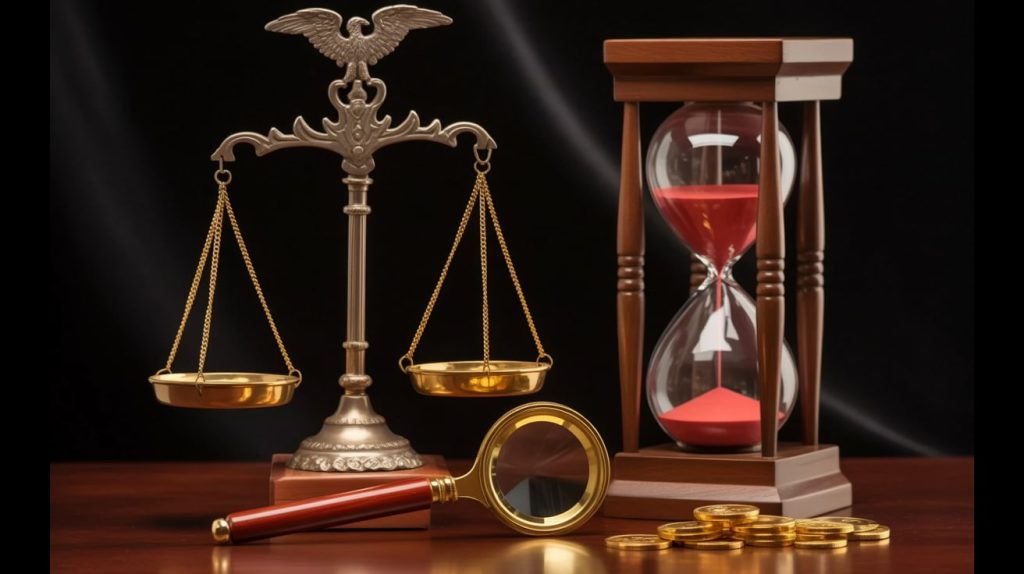Have you ever wondered how federal prosecutors take down entire criminal organizations with a single charge? The answer often lies in racketeering conspiracy laws.
Racketeering involves running illegal businesses or using crime to control legitimate ones. This includes activities like money laundering, fraud, drug trafficking, and extortion. When multiple people work together in these schemes, it becomes a conspiracy.
Comprehending this charge matters more than you might think. Federal prosecutors use racketeering conspiracy to target everyone from street gangs to corporate executives.
The penalties are severe. A single conviction can mean decades in prison and millions in fines. Even if you never commit a crime, knowing these laws helps you understand how justice works in America.
What Is Racketeering Conspiracy?
Racketeering conspiracy is when two or more people agree to participate in ongoing criminal activities through an organized enterprise. Under federal law, this charge falls under the RICO Act.
The government must prove that an agreement existed between people to commit crimes. They also need evidence that someone took at least one step toward achieving the criminal goal.
The keyword is “agreement.” You don’t need to succeed in the crimes. You don’t even need to commit them personally. Simply agreeing to be part of the plan can lead to conviction.
|
How does conspiracy differ from regular racketeering? Regular racketeering requires proof that you committed actual crimes. Prosecutors must show at least two “predicate acts” within ten years. This focuses on your personal criminal actions. Conspiracy works differently. It only requires proof of agreement to participate. There’s no need to prove you committed any crimes yourself. Knowledge of the plan and agreement to join is enough. This makes conspiracy charges much easier for prosecutors to win in court. |
Racketeering Conspiracy Under RICO
The Racketeer Influenced and Corrupt Organizations Act became law in 1970.
Congress created RICO to fight organized crime groups like the mafia. The law targets criminal enterprises that operate through patterns of illegal activity.
RICO expanded federal power to prosecute entire organizations instead of individual crimes. Before RICO, prosecutors could only charge people for specific crimes they committed.
This made it hard to take down large criminal organizations. Leaders often stayed behind the scenes while others committed the actual crimes. RICO changed this by making it illegal to participate in or conspire with criminal enterprises.
Key elements prosecutors must prove for racketeering conspiracy charges:
- Knowledge of the enterprise – Defendants knew about the organization’s criminal nature
- Intent to further goals – An Agreement was made to help achieve the enterprise’s criminal objectives
- Overt act – At least one person took some action toward the conspiracy’s goals
- Interstate commerce – The enterprise’s activities affected commerce between states
These elements make RICO conspiracy a powerful tool for federal prosecutors. They can charge entire organizations and everyone who agreed to participate in their criminal activities.
Racketeering Conspiracy Penalties
The penalties for racketeering conspiracy are among the harshest in federal law. These charges can destroy your reputation, freeze your assets, and separate you from family before you ever step into a courtroom.
Many defendants lose their businesses, homes, and life savings during the investigation phase alone.
Criminal Penalties
- Prison sentences – Up to 20 years in federal prison per RICO count
- Massive fines – Up to $250,000 per individual count or twice the gross profits
- Asset forfeiture – The Government can seize all property connected to the criminal enterprise
- Restitution orders – Must pay back all money lost by victims
- Supervised release – Additional years of probation after prison release
Civil Penalties
- Private lawsuits – Victims can sue for triple damages in civil court
- Business restrictions – Banned from certain industries or professional licenses
- Injunctive relief – Court orders preventing future business activities
- Ongoing monitoring – Government oversight of business operations for years
Long-term Life Effects
- Employment barriers – A Felony conviction blocks most job opportunities
- Professional licenses – Loss of law, medical, financial, and other professional credentials
- Credit and housing – Difficulty getting loans, mortgages, or rental approvals
- Social stigma – Permanent reputation damage in community and family relationships
- Voting rights – Loss of voting privileges in many states until rights are restored
The impact of these penalties extends decades beyond prison release. Ex-convicts struggle to rebuild careers, maintain relationships, and regain respect in their communities.
Many find themselves permanently marked by their conviction, facing closed doors and suspicious looks for the rest of their lives.
Defending a Racketeering Conspiracy Charge
Federal prosecutors approach RICO conspiracy cases like building a puzzle. They start by identifying the criminal enterprise and its goals. Then they collect evidence showing how each defendant fits into the organization.
Prosecutors use multiple types of evidence to prove conspiracy. They rely heavily on witness testimony from cooperating defendants who agree to testify against others.
Financial records show money flows and business relationships. Wiretapped phone calls and surveillance footage capture conversations and meetings.
The government often builds cases over several years. They watch suspects, record conversations, and gather documents before making arrests. This gives them time to build strong cases with overwhelming evidence.
Common Defense Strategies in Court
Defense attorneys must attack the government’s case at multiple points to create reasonable doubt in jurors’ minds.
1. Challenging the Enterprise Element: Defense lawyers attack whether a true criminal enterprise existed. They argue the alleged organization was too loose or informal to qualify under RICO. This strategy works when prosecutors can’t prove structured criminal activity.
2. Denying Knowledge and Intent: Many defendants claim they didn’t know about the criminal nature of the enterprise. This defense argues the person was an innocent participant in what seemed like legitimate business activities.
3. Attacking Witness Credibility: Defense teams focus on discrediting government witnesses. They highlight how cooperating witnesses received reduced sentences for their testimony. They also expose lies, inconsistencies, or criminal backgrounds of key witnesses.
4. Statute of Limitations Defense: RICO conspiracy charges must be filed within five years of the last criminal act. Defense lawyers look for gaps in the alleged criminal activity to argue that charges were filed too late.
Successful defense requires experienced federal criminal lawyers who understand RICO’s complexities and can challenge the government’s evidence effectively.
Importance of Racketeering Conspiracy in Law
Racketeering conspiracy laws have fundamentally changed how the American justice system fights organized crime and white-collar criminal enterprises.
1. Role in Fighting Organized Crime
RICO conspiracy charges gave federal prosecutors tools to dismantle entire criminal organizations. Before 1970, law enforcement could only charge individual crimes. Crime bosses often escaped while their underlings went to prison.
The conspiracy element allows prosecutors to target whole organizations at once. They can charge leaders who never personally committed crimes but directed others to do so. This approach has successfully broken up major crime families, drug cartels, and gang operations.
2. Expansion of Prosecutorial Power
RICO conspiracy significantly expanded what federal prosecutors can charge as crimes. They can now pursue cases impossible under traditional criminal statutes. The broad definition of “enterprise” means they can target corporations, partnerships, unions, and informal associations.
Federal prosecutors gained powerful asset forfeiture tools. They can seize property connected to criminal enterprises before trial. This weakens organizations financially and provides leverage during plea negotiations.
3. Criticisms and Concerns of Overreach
Many legal experts worry that RICO conspiracy gives prosecutors too much power. The broad definitions allow charges in cases that might not involve traditional organized crime. Defense attorneys argue that defendants can face severe penalties for minimal involvement.
Civil liberties groups raise concerns about asset forfeiture abuse. The government can seize property before proving guilt in court. This can destroy innocent people’s lives during lengthy legal proceedings.
Apprehending these complex laws and their far-reaching consequences is essential for anyone facing federal criminal charges or seeking to comprehend how modern justice operates.
Conclusion
Racketeering conspiracy is one of federal law’s most powerful weapons. This charge targets entire criminal organizations, not just individual crimes. The penalties are severe: decades in prison, massive fines, and permanent consequences.
What is racketeering conspiracy? It’s an agreement to participate in ongoing criminal enterprises. You don’t need to commit crimes personally. Simply agreeing to join can result in conviction.
The law affects everyone from street criminals to corporate executives. Consequences extend beyond prison, impacting employment, housing, and relationships for life.
These charges destroy lives even before the trial begins. Asset seizure and reputation damage often occur during investigations.
Facing racketeering conspiracy charges? Contact an experienced federal criminal defense attorney immediately. Your freedom depends on skilled legal representation.







































